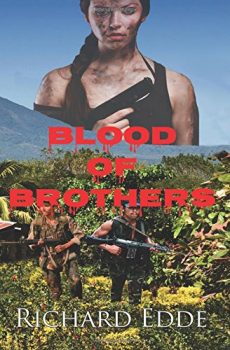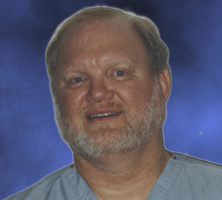Blood of Brothers by Richard Edde
 BLOOD OF BROTHERS, recently released by Black Opal Books, is set in the steamy jungles of Nicaragua during the country’s civil war. Fortunately for us, Richard Edde had not tucked himself away in such a secluded location, and willingly talked with The Big Thrill about his latest work.
BLOOD OF BROTHERS, recently released by Black Opal Books, is set in the steamy jungles of Nicaragua during the country’s civil war. Fortunately for us, Richard Edde had not tucked himself away in such a secluded location, and willingly talked with The Big Thrill about his latest work.
What got you interested in the Nicaraguan civil war?
I have always been interested in jungles. As a child I was fascinated by the Tarzan movies. Still watch them as a matter of fact. I’m intrigued by their exotic locales and the danger that lurks within them. During the Vietnam War, my friends returned with tales of the jungle. Civil wars are always interesting—people struggling for democracy and freedom, for a better way of life. In writing a novel with a historical backdrop, it just seemed natural to combine the two.
What were the different factions at the time in Nicaragua?
After the fall of the Somoza regime, there were two rival groups vying for power and control of the Nicaraguan government. In 1961, the Sandinista National Liberation Front (Frente Sandinista de Liberación Nacional, or Sandinistas) was founded and the group took its name from Augusto Cesár Sandino, who led a Liberal peasant army against the government of U.S.-backed Adolfo Díaz and the subsequent Nicaraguan government in the late 1920s and early 1930s. Inspired by Fidel Castro’s Cuban Revolution, the group sought to be a political-military organization whose objective was the seizure of political power through the destruction of the bureaucratic and military apparatus of the previous Somoza dictatorship.
Throughout their rule, the Sandinistas became more radicalized, especially in times of crisis. For example, in 1981, the Sandinistas announced new economic policies designed to weaken the private sector grasp on farmland. They also confiscated businesses that ostensibly threatened the revolution, and took control of the finances of those who had been gone from Nicaragua for at least six months. In 1982, after Argentine-trained rebels blew up two bridges, the Sandinistas declared a state of emergency, and, among other things, restricted the Nicaraguan press.
Within a year of the Sandinistas’ capture of power, those opposed to the regime began to engage in violent actions. In the summer of 1980, crude organizations of fighters were seeking to start a counterrevolution. These disparate groups comprised former National Guardsmen, ex-Sandinista soldiers critical of the new regime, and peasants and farmers upset with Sandinista land policies. Nicaraguan exiles, including former guardsmen and members of the Conservative Party, gathered in El Salvador, Honduras, Guatemala, and Miami and discussed the prospect of both unarmed and armed opposition to the Sandinistas. Many exiles came to see armed resistance as the only feasible means to moderate Nicaragua; two of them formed a political-military alliance that would come to be called the Nicaraguan Democratic Force (FDN), the main contra faction.
And all that is the backdrop of your latest novel, BLOOD OF BROTHERS?
Yes, it is. The title comes from the Nicaraguan national anthem. On one level it is a pure adventure tale, an American ex-patriot getting caught up in the civil war and not wanting to become involved. But that peace is shattered when a beautiful contra fighter pulls him from a pub just before the rebels blow it up. Then, when a plot to assassinate an important Sandinista colonel fails, and the woman is taken prisoner, our hero is propelled into the conflict, determined to rescue the woman he loves. With the help of a local CIA operative, he embarks on a harrowing journey that will change his life forever—if he manages to survive. On the other side it is a romance story, of how the values of love and freedom triumph over oppression.
What’s next on the horizon? Are you working on your next novel?
Of course. The Photograph will be out next year and is the story of a woman’s quest for her identity and that of her father. It will be followed by Trinity, a murder mystery. Currently I’m writing a novel set in medieval France.
*****
 Richard Edde was born and raised in Oklahoma. After graduating from Central State College, he attended the University of Oklahoma College of Medicine, where he earned his medical degree in 1971. After spending a few years in family practice in two rural Oklahoma towns, he completed a residency in anesthesiology. Following a long career in academia and private practice, he retired to devote time to writing. His first novel, The Photograph, was released in 2014. His second novel, Yeti, was released in 2015. Dr. Edde resides in eastern Oklahoma with his wife.
Richard Edde was born and raised in Oklahoma. After graduating from Central State College, he attended the University of Oklahoma College of Medicine, where he earned his medical degree in 1971. After spending a few years in family practice in two rural Oklahoma towns, he completed a residency in anesthesiology. Following a long career in academia and private practice, he retired to devote time to writing. His first novel, The Photograph, was released in 2014. His second novel, Yeti, was released in 2015. Dr. Edde resides in eastern Oklahoma with his wife.
To learn more about Richard, please visit his website.
- Africa Scene: Iris Mwanza by Michael Sears - December 16, 2024
- Late Checkout by Alan Orloff (VIDEO) - December 11, 2024
- Jack Stewart with Millie Naylor Hast (VIDEO) - December 11, 2024
